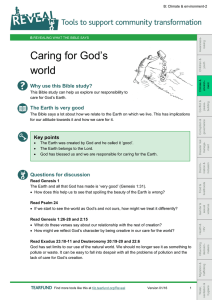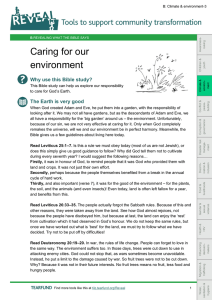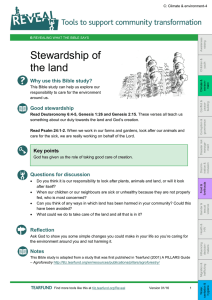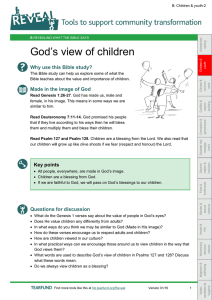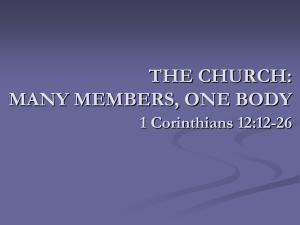B: Conflict & peacebuilding-1
advertisement
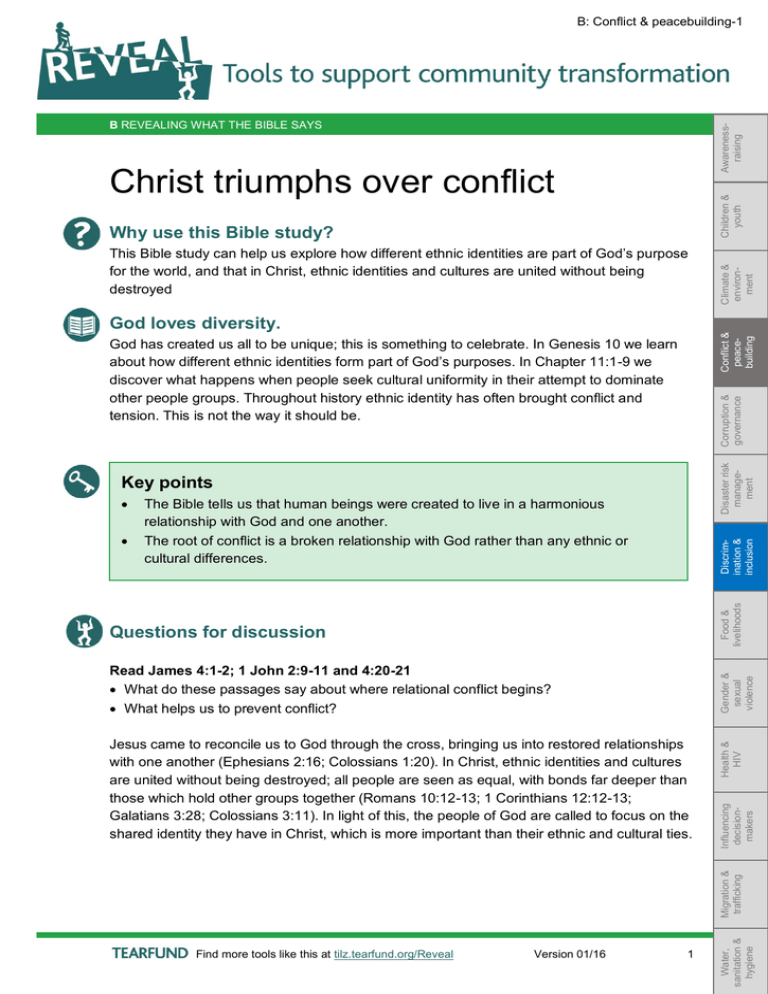
B: Conflict & peacebuilding-1 Awarenessraising B REVEALING WHAT THE BIBLE SAYS Why use this Bible study? This Bible study can help us explore how different ethnic identities are part of God’s purpose for the world, and that in Christ, ethnic identities and cultures are united without being destroyed Conflict & peacebuilding God loves diversity. Disaster risk management Corruption & governance God has created us all to be unique; this is something to celebrate. In Genesis 10 we learn about how different ethnic identities form part of God’s purposes. In Chapter 11:1-9 we discover what happens when people seek cultural uniformity in their attempt to dominate other people groups. Throughout history ethnic identity has often brought conflict and tension. This is not the way it should be. Key points Discrimination & inclusion Food & livelihoods Questions for discussion Migration & trafficking Jesus came to reconcile us to God through the cross, bringing us into restored relationships with one another (Ephesians 2:16; Colossians 1:20). In Christ, ethnic identities and cultures are united without being destroyed; all people are seen as equal, with bonds far deeper than those which hold other groups together (Romans 10:12-13; 1 Corinthians 12:12-13; Galatians 3:28; Colossians 3:11). In light of this, the people of God are called to focus on the shared identity they have in Christ, which is more important than their ethnic and cultural ties. Health & HIV Gender & sexual violence Read James 4:1-2; 1 John 2:9-11 and 4:20-21 What do these passages say about where relational conflict begins? What helps us to prevent conflict? Influencing decisionmakers The Bible tells us that human beings were created to live in a harmonious relationship with God and one another. The root of conflict is a broken relationship with God rather than any ethnic or cultural differences. Find more tools like this at tilz.tearfund.org/Reveal Version 01/16 1 Water, sanitation & hygiene Climate & environment Children & youth Christ triumphs over conflict B: Conflict & peacebuilding-1 B CHRIST TRIUMPHS OVER CONFLICT Awarenessraising Read Ephesians 2:11-22 What does this passage say about reconciliation between Jew and Gentile? What does ‘one new humanity’ mean in this passage (verse 15)? What does it mean for us to become a new unified people in Christ? How does this passage challenge you in your relationship with Christians from different cultures or ethnic groups? Children & youth Climate & environment Conflict & peacebuilding By being placed together within God’s new community we are brought into relationships with those who are different from us. These differences are intended to be a source of blessing, but they can often be a source of tension. The Bible tells us to make every effort to restore relationships where there is conflict (Romans 15:5-6; 2 Corinthians 13:11; Ephesians 4:1-6). This means we need to keep walking in repentance and forgiveness, and know that there are no cultural, ethnic or social barriers that Christ’s love cannot overcome (Matthew 18:21-35; Luke 10:25-37; Colossians 3:12-15). Corruption & governance Read Luke 6:27-42; Romans 12:9 21; Philippians 2:1-8 What principles do we find in these passages for resolving conflict and making peace? What does it mean to love our enemies? What does the passage in Philippians say about unity? Disaster risk management Discrimination & inclusion The Bible also tells us that Christians are to play a role in society as peacemakers (Matthew 5:9). Firstly, as ‘ambassadors of Christ’ we are called to reconcile people to God through the ‘gospel of peace’, which will result in them being reconciled with God’s covenant people (2 Corinthians 5:18-20; Ephesians 6:15). The Church is also called to be prophetic, modelling to society what reconciled relationships look like. It should demonstrate the way of Christ in word, presence and deed, reflecting the coming kingdom where every tribe, language, people and nation will together worship God (John 17:20-23; Revelation 5:9). Food & livelihoods Notes Gender & sexual violence This Bible study was written by David Scott and first published in Tearfund (2013) Footsteps 92 Conflict and peace http://tilz.tearfund.org/en/resources/publications/footsteps/footsteps_91-100/footsteps_92/ Health & HIV Influencing decisionmakers Related tools: A1 – Revealing conflict: information for facilitators [A1: Conflict & peacebuilding-1] B – Love your enemies (Bible study) [B: Conflict & peacebuilding-2] B – Unity in Christ (Bible study) [B: Conflict & peacebuilding-3] C2 – Analysing conflict [C2: Conflict & peacebuilding-1] Migration & trafficking Water, sanitation & hygiene Find more tools like this at tilz.tearfund.org/Reveal 2
